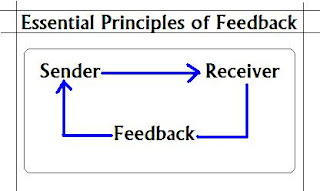Feedback improves the quality of communication. Decision making managers should encourage subordinate to response. Feedback is essential for effective communication. There are some essential principles for feedback which are described below...
1. Description: Feedback must be descriptive so that receiver can express his opinion and feeling in a frank manner. On the other hand, Sender or Communicator can understand the consequences of the communication properly.
2. Specific: Response from the receiver should be specific and certain , so that sender can understand the situation and take further decisions. Confusing feedback is a barrier to the effective communication.
3. Solicited: Feedback should be solicited rather than imposed. Managers should create such an environment where workers can come forward to ask for problem solution. Solicited feedback calls for spontaneous response from the receiver of communication.
4. Clarity or Clearness: Clear Communication is desired to everyone. If feedback is made in a vague way then it creates confusion, miscommunication and even conflict. So, frankly speaking, Feedback should come clearly from the receiver to create meaningful picture.
5. Informality: Feedback should come from informal channel beside formal channel. Informal feedback is encouraged in an organization for its promptness. Such feedback helps lower level employees to interact with top level management. On the other hand, Informal feedback may notify about actual situation.
6. Promptness: Feedback should be made as soon as possible after the message is received. Otherwise, there will be wastage of time, inclusion of irrelevant aspects and other disturbing matters. Unnecessary delay reduces effectiveness of communication.
7. Spontaneous: Feedback should not provided just as a part of formality. It should be given spontaneously. Spontaneous feedback can give proper feedback.
8. Contextual: The feedback must have relevance to the context of the message received. Irrelevant feedback not only hampers communication but also creates bad impression regarding receiver.
These are the principles of effective feedback which should be followed by a receiver to make the communication successful or make an effective communication. So, feedback made considering the above principles will obviously lead to effective communication. Because prompt and immediate feedback makes the communication complete and successful.
 |
| To make feedback effective, A receiver should maintain some principles. |
1. Description: Feedback must be descriptive so that receiver can express his opinion and feeling in a frank manner. On the other hand, Sender or Communicator can understand the consequences of the communication properly.
2. Specific: Response from the receiver should be specific and certain , so that sender can understand the situation and take further decisions. Confusing feedback is a barrier to the effective communication.
3. Solicited: Feedback should be solicited rather than imposed. Managers should create such an environment where workers can come forward to ask for problem solution. Solicited feedback calls for spontaneous response from the receiver of communication.
4. Clarity or Clearness: Clear Communication is desired to everyone. If feedback is made in a vague way then it creates confusion, miscommunication and even conflict. So, frankly speaking, Feedback should come clearly from the receiver to create meaningful picture.
5. Informality: Feedback should come from informal channel beside formal channel. Informal feedback is encouraged in an organization for its promptness. Such feedback helps lower level employees to interact with top level management. On the other hand, Informal feedback may notify about actual situation.
6. Promptness: Feedback should be made as soon as possible after the message is received. Otherwise, there will be wastage of time, inclusion of irrelevant aspects and other disturbing matters. Unnecessary delay reduces effectiveness of communication.
7. Spontaneous: Feedback should not provided just as a part of formality. It should be given spontaneously. Spontaneous feedback can give proper feedback.
8. Contextual: The feedback must have relevance to the context of the message received. Irrelevant feedback not only hampers communication but also creates bad impression regarding receiver.
These are the principles of effective feedback which should be followed by a receiver to make the communication successful or make an effective communication. So, feedback made considering the above principles will obviously lead to effective communication. Because prompt and immediate feedback makes the communication complete and successful.